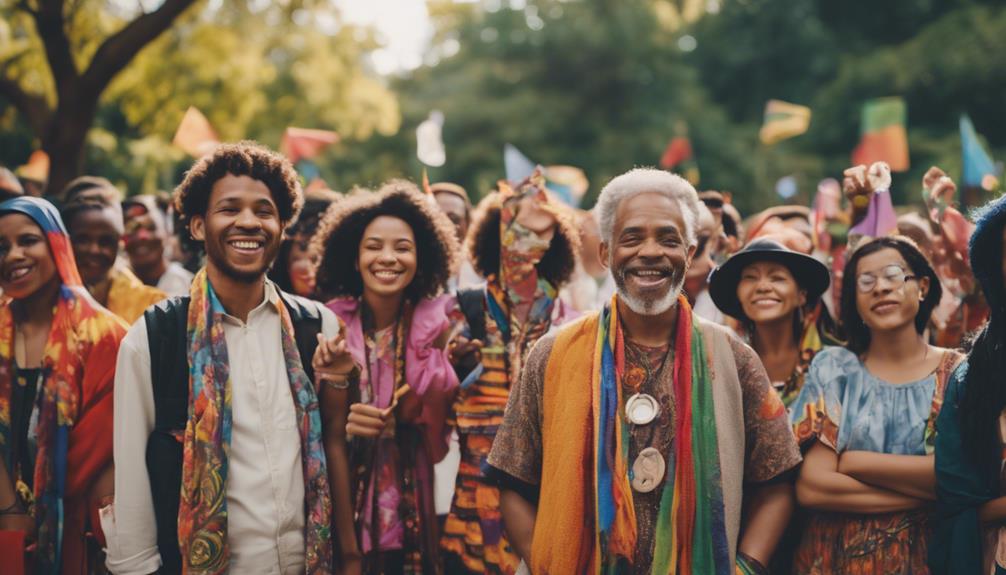Cultural perspectives on self-improvement differ across the world, shaping how you view personal growth. In Western cultures, individual achievements take center stage, while collectivist societies prioritize community well-being, like Japan's "kaizen" approach. Practices vary widely, with some cultures embracing spiritual rituals like India's yoga, and others focusing on balanced lifestyles such as Scandinavia's "lagom." Each culture offers unique methodologies, impacting your journey toward self-enhancement. Understanding these diverse perspectives can enrich your growth experience and offer new insights. Keep exploring, and you'll discover even more about how culture influences your path to improvement.
Key Takeaways
- Cultural values shape self-improvement, with Western cultures focusing on individual success, while collectivist cultures emphasize community and relational dynamics.
- Practices like Japan's "kaizen" and India's "sadhana" reflect cultural approaches to continuous improvement and spiritual growth, respectively.
- Community involvement enhances self-improvement, promoting collaboration, shared experiences, and diverse perspectives for collective growth.
- Balancing personal and social goals is crucial, with individualistic cultures prioritizing personal achievement and collectivist cultures focusing on community well-being.
Cultural Values and Self-Improvement
Cultural values shape how you approach self-improvement, influencing whether you prioritize personal achievement or community well-being. You might notice cultural differences in self-improvement strategies across the globe.
In Western cultures, the emphasis often leans toward individual accomplishments, where personal success drives motivation. You may find yourself seeking validation through accolades and personal milestones. This focus on personal achievement can lead to a greater emphasis on physical well-being and personal growth, as individuals endeavor to improve their health and skills.
On the other hand, in collectivist cultures, self-improvement practices reflect cultural variation that prioritizes community relationships and collective success. For example, in Japan, the principle of "kaizen" promotes continuous improvement through small, incremental changes, focusing on harmony and diligence. In Scandinavian countries, self-improvement aligns with egalitarian values, fostering a sense of social welfare that benefits everyone rather than just the individual.
Moreover, many Indigenous cultures intertwine personal growth with community traditions and spiritual practices, offering a holistic perspective that emphasizes connection to heritage and nature.
As you navigate your self-improvement journey, consider how these cultural influences shape your understanding of success, encouraging you to reflect on whether you lean more toward individual and collective approaches in your life.
Individualism Vs. Collectivism

When you explore self-improvement, it's essential to understand the difference between individualism and collectivism.
In individualistic cultures, personal achievement takes center stage, while collectivist societies prioritize group harmony and social responsibilities.
Balancing your personal goals with the needs of your community can shape your growth journey in significant ways.
Defining Individualism and Collectivism
How do individualism and collectivism shape our understanding of self-identity and personal goals?
Individualism emphasizes personal autonomy, self-expression, and independence, often seen in Western cultural groups like the United States. Here, you might define yourself through personal achievements and unique traits, leading to a self-concept focused on individual goals. You're encouraged to be self-reliant and define success on your own terms.
In contrast, collectivism prioritizes group harmony and social cohesion, prevalent in many Asian cultures like China and Japan. In these settings, you may identify more with your community than with personal ambitions. Your self-description might include social roles, such as being a good friend or a supportive family member.
Research, including the Twenty Statements Test, shows that individuals from collectivist cultures favor relational identity over individual traits, highlighting a fundamental divergence in self-views.
Cultural psychologists argue that your self-concept is socially constructed and varies considerably across cultural groups. While individualistic views focus on personal goals and autonomy, collectivistic perspectives stress the importance of relationships and communal identity, shaping how you view yourself and your aspirations.
Cultural Impacts on Growth
The way you pursue personal growth can vary greatly depending on whether you come from an individualistic or collectivistic culture, influencing your self-improvement strategies and goals.
In Western cultures, like the United States and Australia, you're likely to focus on personal achievement and self-expression. This often translates into setting individual self-improvement goals, where your growth narrative centers on personal success and psychological attributes.
Conversely, if you hail from a collectivistic culture, such as Japan or Malaysia, your self-improvement efforts may revolve around group harmony and community well-being. Here, personal growth is often framed within the context of social roles and relational dynamics. You might find that your development goals prioritize contributions to your community over purely personal gain.
Research, including the Twenty Statements Test, has shown that these cultural differences shape how you view yourself and your growth journey.
Additionally, the interplay between individualistic and collectivistic perspectives can create diverse pathways for self-improvement, underscoring the importance of cultural sensitivity.
Even in pop culture, you'll notice these themes manifest, reflecting broader societal values on growth.
Balancing Personal and Social Goals
Guiding the balance between personal and social goals often presents a challenge, especially as individualistic and collectivistic values shape your self-improvement journey.
In individualistic cultures, like the U.S. and Australia, you might prioritize personal achievement and self-expression. This focus encourages you to set and pursue personal goals, enhancing your self-concept through individual accomplishments.
Conversely, in collectivist cultures such as Japan and Malaysia, your self-improvement efforts may center around community well-being and social harmony. Here, the group's needs often take precedence over personal aspirations, creating potential conflict when your goals diverge from the expectations of your community.
This tension highlights how self-concept varies across cultures. For instance, individuals in the U.S. may emphasize personal traits, while those in China might focus on social relationships.
Recognizing these differences is essential for maneuvering your self-improvement journey. By understanding the cultural context of your goals, you can integrate both individualistic and collectivistic perspectives, creating a more holistic approach to personal and societal development.
Balancing these elements can lead to a fulfilling self-improvement experience that honors both your individual desires and your social responsibilities.
Global Practices of Self-Development

When you explore global practices of self-development, you'll notice how cultural rituals and traditions shape the journey.
In many cultures, the importance of self-reflection plays a vital role in identifying self-limiting beliefs that hinder personal growth.
You'll find that some cultures prioritize collective growth, while others emphasize individual achievement, leading to diverse self-help methodologies.
Understanding these differences can enhance your approach to personal growth and well-being.
Cultural Rituals and Traditions
Cultural rituals and traditions around the world offer unique pathways for self-development, inviting you to explore deeper connections with yourself and your community.
In many Indigenous cultures, vision quests act as profound self-discovery practices, helping you connect with nature and your inner self.
Similarly, Japanese culture's "Ikigai" encourages you to find purpose in life by balancing your passions, talents, and societal needs, enhancing your mental well-being.
Indian traditions emphasize yoga and meditation as essential cultural practices, promoting self-improvement through physical, mental, and spiritual development, with millions practicing daily for mindfulness and health.
The Scandinavian concept of "Lagom," meaning "just the right amount," guides you toward balance in life, fostering self-improvement through moderation and contentment.
In various African cultures, communal storytelling and oral traditions impart wisdom and life lessons, promoting self-reflection and personal growth through shared experiences.
Collective Versus Individual Growth
Exploring self-improvement reveals a striking contrast between individualistic approaches favored in many Western societies and the collective growth practices embraced by various cultures worldwide.
In individualism, the focus is often on personal achievements and self-actualization, sometimes neglecting community welfare. This approach can lead to feelings of isolation as you pursue your goals alone.
On the other hand, collectivism, prevalent in many Asian cultures, emphasizes community and familial growth. Here, self-improvement isn't just about you; it's about how your progress benefits the group. Research shows that in collectivist societies, shared experiences and communal support systems foster collaboration over competition, enriching personal development through social bonds.
When you engage in collective growth, you experience mutual accountability, which strengthens relationships and encourages a sense of belonging.
This holistic approach to self-improvement, blending both individual and collective strategies, is increasingly recognized as beneficial. By integrating the strengths of both individualism and collectivism, you can address personal and societal challenges more effectively, creating a balanced path towards growth that respects both self and community.
Diverse Self-Help Methodologies
Diverse self-help methodologies around the world offer unique pathways to personal development, each rooted in distinct cultural values and practices.
In Japan, for instance, "kaizen" emphasizes continuous improvement through small, incremental changes, which you can adopt in both your personal and professional life.
In India, "sadhana" involves disciplined practices like meditation and yoga, guiding you toward spiritual growth and self-realization.
If you look to Scandinavia, the concept of "lagom" encourages a balanced lifestyle, promoting self-acceptance over the relentless pursuit of perfection.
Meanwhile, in Brazil, "jeitinho" showcases a creative and flexible approach to problem-solving, often highlighting the importance of community connections in your self-improvement journey.
In the United States, self-help methodologies focus heavily on personal empowerment. Techniques from positive psychology, such as gratitude and visualization, can greatly enhance your mental well-being.
Each of these cultural perspectives provides valuable insights, allowing you to choose the self-help methodologies that resonate most with you.
Historical Perspectives on Self-Help

The self-help movement has deep historical roots, beginning with Benjamin Franklin's "Project for Moral Perfection," which championed individual growth without relying on external guidance. This early foundation laid the groundwork for a view of cultural self-improvement that flourished over several decades.
Throughout history, self-help has evolved considerably, marked by several key developments:
- Antebellum mercantile libraries supported self-education for economic advancement, particularly important in shaping American self-help.
- Early literature focused on etiquette and social conduct, shifting from bodily control to mental control as urbanization changed personal spaces.
- Influential figures like Dale Carnegie and Napoleon Hill wrote seminal texts that sold millions, shaping the self-help landscape.
This historical perspective highlights how self-help has continuously adapted to societal changes while emphasizing individual agency.
Understanding these roots can deepen your appreciation for contemporary self-improvement practices, reminding you of the timeless quest for personal growth.
Psychological Foundations of Growth

When you think about self-improvement, consider how individualism and collectivism shape your approach.
Cultural norms influence your perceptions of success and failure, guiding your growth strategies.
Resilience can be cultivated through discipline, which serves as the foundation for building resilience in various cultural contexts.
Understanding these psychological foundations can help you navigate your personal development journey more effectively, as consistent habits foster discipline that enhances overall well-being.
Individualism Vs. Collectivism
Cultural values shape how you view self-improvement, with individualistic societies often celebrating personal achievement while collectivist cultures focus on the importance of community and social harmony.
In individualistic cultures like the U.S. and Australia, self-improvement is seen as a personal journey aimed at maximizing your potential. You might prioritize personal goals and self-expression, leading to a narrative that highlights individual accomplishments.
In contrast, collectivist cultures such as Japan and Malaysia emphasize the role of the group. Here, self-improvement often revolves around enhancing relationships and fulfilling social obligations. You might find that growth is tied to the well-being of your community rather than purely personal success.
Consider these distinctions:
- Individualistic societies celebrate personal achievement.
- Collectivist cultures promote group harmony and social roles.
- Self-improvement in individualistic cultures focuses on personal goals.
Understanding these differences can help you navigate your own self-improvement journey, recognizing that your cultural backdrop plays a significant role in how you define and pursue growth.
Cultural Norms Impact Growth
Recognizing how cultural norms shape your understanding of growth can greatly influence the effectiveness of your self-improvement efforts. In Western societies, you might find a focus on independence and self-expression, where personal achievements define success. This perspective encourages you to pursue individual goals, often leading you to prioritize your unique traits when evaluating yourself.
Conversely, if you're from a collectivist culture, like Japan or Malaysia, your growth perception likely revolves around community and relational dynamics. Here, self-improvement is intertwined with social identities and group affiliations. Research shows that you might emphasize your contributions to the community over personal accolades.
The Twenty Statements Test illustrates this difference: while U.S. respondents showcase their unique characteristics, Malaysian participants often highlight their collective identities.
Understanding these cultural nuances helps you tailor your self-improvement strategies. By aligning your growth efforts with your cultural background, you increase the likelihood of achieving meaningful outcomes. Embracing these differing perspectives allows you to engage more effectively in your personal development journey, ensuring that your approach resonates with your cultural context.
The Role of Community

Community plays an essential role in self-improvement, as it fosters shared experiences that enhance personal growth while tackling collective challenges. When you engage with others in your journey, you not only gain support but also broaden your perspective on issues you might face alone. Research shows that community-oriented self-help initiatives lead to higher satisfaction and well-being compared to individual pursuits.
Consider these aspects of community in self-improvement:
- Shared Experiences: Collaborating with others helps you learn from their journeys and challenges.
- Social Connections: Being part of a community reduces feelings of isolation, providing encouragement and motivation.
- Diverse Perspectives: Group efforts can tackle systemic issues more effectively by incorporating various viewpoints, leading to thorough solutions.
Critiques of Self-Improvement Ideals

Many critics argue that the self-improvement industry often promotes unrealistic ideals that can hinder genuine personal growth. You might find that the advice offered frequently lacks scientific backing, leading you to set expectations that are far from achievable. This over-commercialization, as noted by critics like Mark Manson, often dilutes the effectiveness of self-help materials, leaving you feeling dependent on them instead of fostering your own accountability. Moreover, the emphasis on quick fixes and instant results can create a culture of self-criticism and comparison, which detracts from meaningful progress unrealistic expectations.
Moreover, the obsession with becoming the "best version" of yourself can create a toxic cycle of competition and comparison. Instead of fostering genuine self-discovery, this mindset can lead to burnout and disappointment. Many self-help narratives focus solely on individual success stories, neglecting the importance of community and collaborative growth. This oversight can leave broader societal issues unaddressed and make you feel isolated in your journey.
Additionally, the commodification of self-improvement shapes moral and ethical standards, often prioritizing achievement over your personal well-being. As you navigate this landscape, it's crucial to remain critical and discerning about the ideals presented to you, ensuring they align with your values and true potential for growth.
Digital Influence on Personal Growth

Digital technology shapes how you approach personal growth, driving a culture of constant self-monitoring and productivity. With the rise of apps and online platforms, you may find yourself immersed in a cycle of comparison, continuously measuring your progress against the curated lives of others. This environment can heighten pressure, leading to burnout and mental health challenges. It's vital to remember that prioritizing balanced nutrition and incorporating regular physical activity are foundational aspects of overall wellness that can support your self-improvement journey.
Consider these aspects of digital influence on your self-improvement journey:
- The convenience of tracking your habits and goals through various apps can be motivating.
- Constant connectivity may foster unrealistic expectations for rapid personal change.
- Many self-help methods found online lack scientific backing, offering superficial advice.
While digital tools can enhance your self-improvement efforts, it's important to remain aware of their potential drawbacks. Balancing technology's benefits with authentic connections and realistic expectations can help you navigate the complexities of personal growth in today's digital age.
Ultimately, it's about finding a sustainable approach that nurtures both your mental well-being and your aspirations.
Future Trends in Self-Help

Future trends in self-help are shifting towards collective growth strategies that prioritize societal well-being over traditional individualistic approaches.
You'll notice an increasing emphasis on empathy and social responsibility, as the industry reshapes itself to include community-oriented self-improvement initiatives. This evolving landscape recognizes the importance of balancing your individual goals with collective societal issues, fostering collaboration rather than competition.
As you explore self-help resources, you might find a stronger focus on mindfulness and self-care practices. These elements are essential in addressing the rising concerns of burnout and mental health challenges prevalent in achievement-oriented cultures. By integrating these practices, you can cultivate a healthier mindset that values both personal and communal well-being.
Moreover, the rise of digital platforms will likely transform how you engage with self-help. Expect technology to play a pivotal role in community-building and support, promoting shared experiences over solitary pursuits. This shift allows you to connect with others on similar journeys, enriching your growth through collaboration.
As these trends continue to unfold, self-help will become a more inclusive and supportive domain, ultimately enhancing your personal development while contributing to societal progress.
Integrating Cultural Insights

Integrating cultural insights into self-improvement practices helps you recognize the diverse ways communities shape personal growth and success. By understanding these perspectives, you can tailor your approach to align with both individual aspirations and collective values. This integration can lead to more effective self-improvement strategies that resonate with your unique context.
Consider these key aspects:
- Community Focus: In collectivist cultures, enhancing social roles and relationships is often prioritized over personal achievements.
- Cultural Identity: Your self-concept may differ based on cultural background; for instance, Western perspectives emphasize personal attributes, while collectivist views highlight social identities.
- Holistic Approaches: Incorporating community feedback and shared experiences can create a more thorough self-help framework, benefiting both you and your community.
Frequently Asked Questions
How Does Culture Influence Self Development?
Culture shapes your self-development by influencing your values, beliefs, and goals. It affects how you view individuality versus community, guiding your approaches to growth, motivation, and the importance you place on relationships and social identities.
How Different Cultures Around the World Practice Self Care?
Imagine sipping herbal tea in an Indian garden, surrounded by yoga practitioners. Different cultures embrace unique self-care methods: from Sweden's balance in "Lagom" to Japan's nature-infused "Shinrin-yoku," each offers rejuvenating paths to well-being.
How Self Is Perceived Differently in Different Cultures?
You see self-perception varies widely across cultures; in the West, it's often about individual traits, while in collectivist societies, it emphasizes social roles and group identity, shaping how you view yourself and your relationships.
How Does Culture Shape People's Perceptions of Themselves and the World Around Them?
Culture shapes how you view yourself and your surroundings. It influences your values, beliefs, and relationships, making you see your identity and experiences through the lens of communal or individualistic perspectives, depending on your cultural background.
Conclusion
In a world where self-improvement often feels like a race, remember the wisdom of the tortoise and the hare: slow and steady wins the race.
By embracing diverse cultural perspectives, you can enrich your journey toward personal growth.
It's not just about climbing the ladder but understanding the roots that ground you.
As you forge your path, keep an open mind, and integrate these insights—they might just be the secret ingredient to your own success story.










